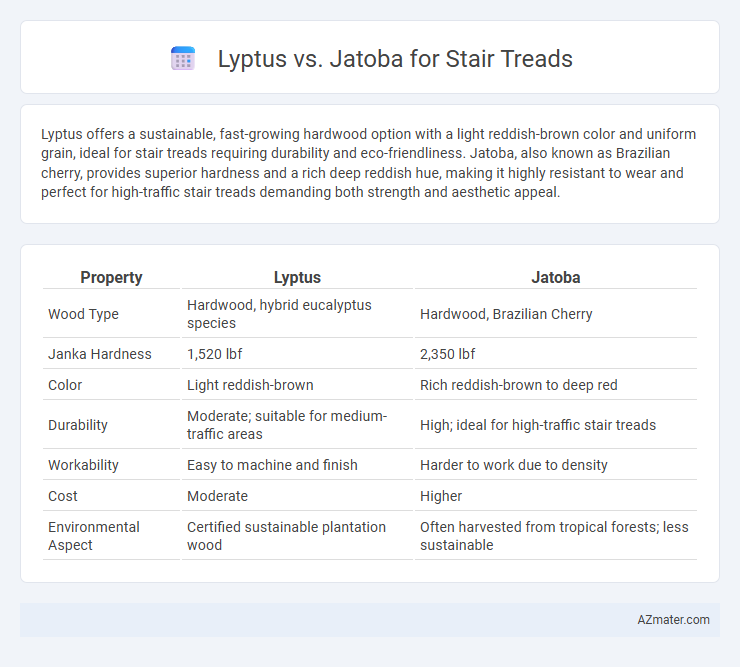Lyptus offers a sustainable, fast-growing hardwood option with a light reddish-brown color and uniform grain, ideal for stair treads requiring durability and eco-friendliness. Jatoba, also known as Brazilian cherry, provides superior hardness and a rich deep reddish hue, making it highly resistant to wear and perfect for high-traffic stair treads demanding both strength and aesthetic appeal.
Table of Comparison
| Property | Lyptus | Jatoba |
|---|---|---|
| Wood Type | Hardwood, hybrid eucalyptus species | Hardwood, Brazilian Cherry |
| Janka Hardness | 1,520 lbf | 2,350 lbf |
| Color | Light reddish-brown | Rich reddish-brown to deep red |
| Durability | Moderate; suitable for medium-traffic areas | High; ideal for high-traffic stair treads |
| Workability | Easy to machine and finish | Harder to work due to density |
| Cost | Moderate | Higher |
| Environmental Aspect | Certified sustainable plantation wood | Often harvested from tropical forests; less sustainable |
Introduction to Lyptus and Jatoba for Stair Treads
Lyptus, a rapidly renewable hardwood derived from eucalyptus trees, offers uniform grain and resistance to wear, making it an eco-friendly choice for stair treads requiring durability and consistent appearance. Jatoba, known as Brazilian cherry, features a rich reddish-brown color and exceptional hardness, providing superior impact resistance and longevity for high-traffic stair applications. Both woods deliver unique aesthetic and functional benefits, with Lyptus favored for sustainability and Jatoba prized for its toughness and striking visual appeal.
Appearance and Color: Lyptus vs Jatoba
Lyptus stair treads exhibit a consistent, light to medium reddish-brown color with subtle grain patterns, providing a uniform and contemporary aesthetic. Jatoba stair treads feature a richer, more varied appearance with deep reddish hues and distinct dark streaks, creating a bold and vibrant look. The color stability of Lyptus offers minimal darkening over time, whereas Jatoba tends to deepen and intensify its color with age and exposure.
Hardness and Durability Comparison
Lyptus, a hybrid eucalyptus wood, has a Janka hardness rating of approximately 1540, making it moderately hard and suitable for stair treads in residential settings. Jatoba, also known as Brazilian Cherry, boasts a significantly higher Janka hardness of about 2350, indicating superior resistance to dents and wear. For stair treads requiring exceptional durability and impact resistance, Jatoba outperforms Lyptus, offering longer-lasting performance in high-traffic areas.
Workability and Installation Differences
Lyptus stair treads offer superior workability due to their consistent grain and uniform density, allowing for easier cutting, shaping, and sanding compared to Jatoba. Jatoba's hardness provides exceptional durability but requires more effort and specialized tools for installation, often increasing labor time and difficulty. The smoother machining of Lyptus reduces installation challenges, making it a preferred choice for projects demanding efficiency and precision.
Price and Availability Considerations
Lyptus wood generally offers a more affordable option for stair treads compared to Jatoba, often priced lower due to its faster growth rate and sustainable plantation sources. Jatoba, a denser hardwood native to Central and South America, commands a higher price because of its durability and rich aesthetic appeal, but may have limited availability depending on regional import restrictions. Availability of Lyptus is typically better in North America due to local plantations, while Jatoba may require longer lead times and higher shipping costs depending on supplier location.
Environmental Impact and Sustainability
Lyptus, a hybrid eucalyptus grown on managed plantations, offers a highly sustainable option for stair treads due to its rapid growth and minimal pesticide use, reducing deforestation pressure. Jatoba, native to South American rainforests, provides durable hardwood but poses greater environmental concerns related to habitat disruption and slower regrowth rates. Choosing Lyptus supports eco-friendly forestry practices and carbon sequestration, making it a preferable choice for environmentally conscious stair tread applications.
Maintenance and Longevity of Stair Treads
Lyptus stair treads are appreciated for their low maintenance requirements due to their natural resistance to wear and moisture, making them less prone to cracking or warping over time. Jatoba, also known as Brazilian cherry, offers exceptional durability and hardness, which contributes to its long lifespan but may require more frequent refinishing to maintain its rich color and prevent surface scratches. Both woods provide excellent longevity, but Lyptus demands less upkeep, whereas Jatoba's maintenance involves periodic sanding and sealing to preserve its aesthetic appeal.
Slip Resistance and Safety Features
Lyptus stair treads offer moderate slip resistance due to their smooth grain and dense structure, making them durable but requiring additional treatment for enhanced safety. Jatoba stair treads provide superior slip resistance with naturally coarse texture and hardness, reducing the risk of slips and falls. Both woods benefit from anti-slip finishes or nosing for critical safety improvements in high-traffic stair applications.
Best Uses and Design Styles for Lyptus and Jatoba
Lyptus offers a sustainable option with a fine, uniform grain ideal for contemporary stair treads featuring sleek, minimalist designs and light to medium finishes. Jatoba, known for its dense hardness and rich reddish-brown color, suits traditional or rustic stair treads, enhancing spaces with warm tones and pronounced grain patterns. Both woods excel in durability, but Lyptus fits best in modern aesthetics while Jatoba complements classic and robust interior designs.
Final Verdict: Choosing the Right Wood for Your Stairs
Lyptus offers a sustainable and affordable option with good hardness (Janka rating around 1,410), making it suitable for residential stair treads. Jatoba, also known as Brazilian Cherry, boasts a significantly higher Janka hardness of approximately 2,350, offering superior durability and rich, deep reddish tones ideal for high-traffic areas. Choose Jatoba if you prioritize longevity and striking aesthetics, while Lyptus fits well for budget-conscious projects seeking eco-friendly hardwood with decent wear resistance.

Infographic: Lyptus vs Jatoba for Stair Tread
 azmater.com
azmater.com